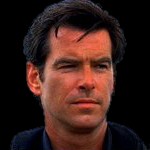



Back
to Articles Page
Pierce
Brosnan Biography || Filmography || Picture
Gallery || Links
The Happy Valley race track is serene in the afternoon sun, which warms the velvety green grass in its centre and the nearly empty stands. It has a certain innocence -- as much as a race track can have when it's surrounded by enormous highrises of such density that one wonders why their weight doesn't plunge them through the ground into the sea. That is an insignificant speculation in Hong Kong, because if one building falls down, another will take its place tomorrow, as is evidenced by omnipresent construction cranes. "The sound of the pile driver is the official song of Hong Kong," says a longtime resident.
On the fifth level of the track, in a private box, is a group of festive, elegantly dressed people, including Ian Dunross (Pierce Brosnan), tai-pan (a Cantonese expression that means "supreme leader") of Noble House, the leading trading company in Hong Kong, and Quillan Gornt (John Rhys-Davies) tai-pan of the second leading trading company. Besides being lifelong enemies, they have horses racing against each other today. Even worse: Gornt can't keep his eyes off Casey Tcholok (Deborah Raffin), an American financial tycoon, who can't keep her eyes off Dunross. This is only one of many highly charged moments to be unleashed in James Clavell's Noble House. The party up in the box gets rolling a little late because of an incident on the ground. Gary Nelson, director of the mini-series, had given an interpreter instructions on how he wanted the 100 Chinese extras playing racegoers to react to the races that were supposed to be running. Nelson had said, "They are only to look at four places -- the straight-away, the far turn, the near turn and the finish line. And then, when the race is over, they're supposed to cheer. Give them numbers and call one for each position." After a 15-minute conference with his extras, the interpreter came back nodding and Nelson called for a rehearsal. The interpreter yelled out a number -- and every one of the extras looked in a different direction. He called out a second number, and they looked in still other directions. Nelson, nearly beside himself, screamed, 'I "Cut!" The extras let out a cheer.
Clearly, when East and West come together it's not so much a meeting as a collision. Nobody knows this better than James Clavell, whose best-selling novel -- reflected in Eric Bercovici's screenplay -- is filled with the superstitions, sage sayings and outrageous palaver that are rampant in Hong Kong and China (to which Hong Kong once belonged -- and will again in 1997). Says Clavell, "When you're in China, you may not believe in these god things, but you'd better be a little Chinese."
To prove his point, as soon as he heard that NBC had given Noble House a tentative go early in 1986, Clavell contacted the best feng shui man in Hong Kong. Feng shui is a ceremony, part Buddhist, part folklore, that reveals the advisability of future actions, appeases the gods and frightens evil forces away. The first Noble House ceremony was held to get advice on the best day, time and location to begin filming the miniseries. The second, to bless the project, was held in early January 1987 on the roof of the Victoria Hotel, where the Noble House company was headquartered. (Clavell says he doubts that NBC will consult a feng shui man about a recommended air date, but adds, "I will, on their behalf, and they've always been very kind to take my advice so far.")
East and West occasionally manage a certain harmony. The nucleus of the crew, whom Bercovici has hired, is Italian. Very quickly they have learned how to curse in Cantonese; and the Chinese crew members have picked up certain Italian hand and arm gestures and gross references to bodily parts and relationships with family members. It is not unusual for a Chinese on this set, when calling for silence, to shriek, "Sirencio!"
Sometimes the twain never meet. Pierce Brosnan, who's been trying to get into the local lifestyle with lessons in tai chi (a Chinese exercise that resembles shadow boxing), complains that he has a running battle with the Chinese woman in the hotel's dry-cleaning department. He will bring in his bag of soiled clothing, and she will "drag all my laundry across the table, underpants and socks, while five Germans and five Americans are watching. I tell her, 'Look, I'm going to give the laundry to you and walk away, and then you can count it when I'm not around.' She hates me, I know she hates me. she throws daggers at me with her eyes."
She may be the only person in Asia who feels that way. To borrow from the Sara Lee jingle: Nobody doesn't like Pierce Brosnan. Costar Julia Nickson, who appeared in "Rambo: First Blood Part II," says, "When you work on a Stallone picture, he is the only one that counts. Pierce is very unassuming. You wouldn't know that he's the star of the show at all. If he wasn't so handsome, you wouldn't know who he was." Bercovici, who, along with Clavell and Nelson made the decision to offer the part to Brosnan (Bercovici is also producer and Clavell is executive producer), says, "He is obviously an incredibly handsome man, but he's a pro, not a model. I think this is his last television appearance; he's going to be a movie star."
Brosnan says, "I'd like to do more movies. I've done enough television to last me a while, and enough theatre. But I'm not going to be smart and say, 'That's it, I won't do another television series!' You can never say things like that as an actor."
With a touch of irony, he adds, "The business is full of surprises." By now most of the world knows that in 1986, when Brosnan's NBC series Remington Steele was canceled, he was offered the role of James Bond in "The Living Daylights." Then Steele was resuscitated, Brosnan was held to his network contract, and the deal fell through, with Timothy Dalton getting the 007 part.
"In the end," says Brosnan, "I just threw my hands up and said, 'What the heck, it was just a job' ..." his voice dips into regret, "... a job that came with a lot of hoopla." He admits, though, that had he played 007, he would have been tied to a five-picture contract, trading one kind of bondage for another. He would also not now be playing Ian Dunross, a role that gives him the chance to be tough, ruthless, romantic and sensitive, minus all the teeth-grinding cutesy antics required by the plots of Remington Steele.
Noble House is about big-business piracy in Hong Kong. When it opens, Dunross is named tartan. His archenemy, Quillan Gornt, wants to destroy him and take over Noble House. Meantime, a couple of American tycoons (Raffin and Ben Masters) have come to Hong Kong to make a financial deal with him. But in Clavell's Hong Kong, there is no such thing as a single deal. Double-dealing and triple-crossing are more the style of the international connivers here. Viewers will see a manipulated run on a bank, selling short on the stock market, the fixing of horse races, kidnapping, seductions and murders. Running counterpoint are the burning and sinking of a floating restaurant and a catastrophic landslide. (Many of these incidents, and "Noble House" itself, Clavell says, are based on fact.) Add to this a couple of juicy love stories, especially the one between Brosnan and Raffin (who brings a light comic element to her role as a tough wheeler-dealer), with everything done in flashy cars, speedboats, mansions and casinos. The production, costing over $16 million (U.S.) --with eight weeks of exteriors shot in Hong Kong and another eight for interiors in the De Laurentiis studio in Wilmington, N.C. --has been without incident. The closest it comes to disaster is one week in late February during night filming on the Sai Kung peninsula, outside the city. Right off the water is a 48-foot-high steel structure built to resemble the Floating Dragon, a restaurant where, in the middle of a lavish party, a fire breaks out and the guests must dive overboard. Over three nights, accom- panied by vicious wind and intermittent rain, this scene is repeated many times. For one shot, a duplicate top deck has been built close to the Floating Dragon set. It is only 15 feet high, and beyond its edge, instead of water, are corrugated cardboard boxes supporting several layers of mattresses. Raffin gets ready for a choice moment, when she will whip off her evening gown, tie it around her waist and make a dive. Somebody screams, ''Abandon ship!" and Raffin removes her dress, ties it around her waist and dives onto the mattresses -- three times. "I'm not sure which was worse -- standing out here freezing," she says, "or total embarrassment at being in my underwear in front of everybody."
Brosnan, climbing off the mattresses with stupendous Úlan, has just graciously -- though uneasily -- accepted the ninth compliment of the evening on how extraordinarily handsome he looks. His smile is satiric as he slaps the sides of his face and says, "I can't wait to play character roles. I've been here for six weeks, eating garbage and drinking beer and getting fat, and when I get home my wife will welcome me as another Orson Welles."
"Poor baby," somebody says. "Everyone should have his troubles."
Top
of this page
Back
to Articles Page
Pierce Brosnan Biography || Filmography || Picture Gallery || Links